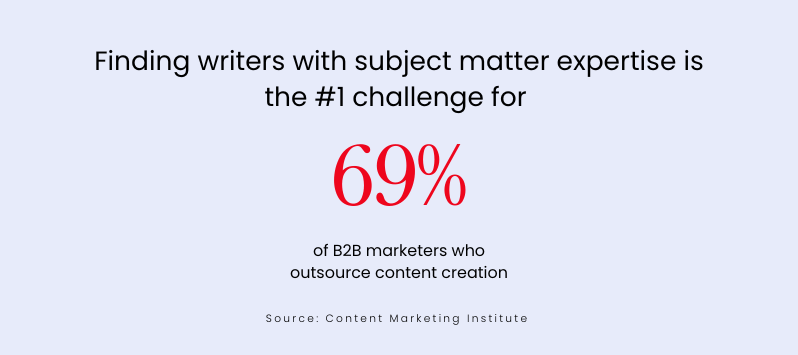4.95 billion people are on the internet. Every. Single. Day.
While we’ve increasingly come to associate the “internet” with social media, people are doing more than just scrolling through a celebrity’s Insta feeds.
They’re looking for informational depth, actionable strategies, and answers to their biggest business questions. Most of the time, however, that’s not what they’re getting.
The SERP is stuffed with the same listicles and blog posts claiming to provide expertise. But let’s be real. What they really mean is: “We’re going to say all the same things in slightly different words.”
If you want to not only win a top position on Google’s page one, but actually capture and convert readers once you get there — you need to up your game with content that is:
- Digestible
- Engaging
- And most importantly, valuable
But you don’t need to hire a geologist to write a myth-busting article on mood-altering minerals, or an economist to give you the latest analysis on rising inflation and production costs. The internet is full of high-value information just waiting to be excavated — and yes, you can do the digging yourself.
Hiring subject matter experts (SMEs) is always an option for your content program, but it’s not the only one. Learning how to research like a subject matter expert can also help you confidently join the conversation.
Two quick ways to add depth to your B2B content
There are many ways to add validity, credibility, and thought leadership to your written B2B content. But how do you know which approaches will work for your brand?
And how many do you actually have time for in a weekly agenda that’s already packed with dozens of other tasks?
First, ask yourself: “What’s the real end goal of the piece I’m about to write?”
- Do you want to lay down the facts so your reader can make an informed decision?
- Are you trying to open up a dialogue around a specific problem, topic, or use case?
- Are you trying to sell a certain approach, ethos, or solution?
Whatever the goal, sprinkling in the right amount of expertise can take your content from “Okay, cool” to “Wow, this is screaming expertise! 🤯”.
Here are three tips to elevate your content in five minutes or less.

1. Put the latest trends in context
No matter what topic you’re writing about, time has left its mark.
New developments emerge, business landscapes shift, new events disrupt age-old best practices. Time always affects change. It’s just a matter of bringing it to light in your content. 💡
By giving your readers a glimpse into data-driven predictions for the future, and/or how they fit into the patterns of the past, you can add a layer of insight similar to what they might read in a business book or journal.
Say you’re writing about inventory management for DTC brands. You could include an overview of:
- The percentage of businesses impacted by the supply chain disruptions of the early 2020s.
- Recent stats and data on elements driving future shifts — consumer trends, technology, labor developments, strikes, etc.
- Comparison numbers from previous years to make your case for whether the situation is getting better or worse.
Using data to support your perspective is a fast and easy way to boost your credibility, while offering even more value to the reader.
✎ Pro Tip: Take this one step further by including real examples and case studies from the annals of business history. Whether it’s Apple’s product design or GE’s performance management, there’s a brand story to mark every major business milestone.
2. Find the questions no one else is answering
Nobody wants to waste time reading something they already know. But how much detail should you include?
Staying in tune with your audience can help you understand how much information they already have and which questions they’re still looking to answer.
Let’s stick with our example of speaking to the owner or other C-level at a DTC brand. Chances are, they’re already up-to-date on the latest supply chain issues. You need to go beyond the surface.
If they’re an entrepreneur, what questions might they be asking?
- They might want to know how these issues could cause economic shifts and to what extent
- They might be interested in understanding the logistics of shipping and delivery overseas, and what international events might be contributing to the problems
- They could be interested in learning how to navigate in the near and distant future
Voice of customer (VoC) research is extremely necessary if you want to speak with your audience, not at them. Tuning into conversations happening on Reddit, Facebook, and Slack can give you an inside view into what your reader actually wants to know.
Once you’ve figured out what kinds of questions your readers are asking, you can focus on addressing them through valuable content they’ll keep coming back to.
Great writers = great content
At Pointed, we’re all about writing content B2B readers actually want to read.
Good writing speaks for itself. Let us do the talking for your brand.
Arya Dixit is a freelance B2B/B2C copywriter, creative writer, and editor obsessed with slipping in a little humor between words (a terrible habit, really). She enjoys connecting with people and brands to craft narratives that are unique, valuable and impactful. She lives in Pittsburgh and devours General Tso’s tofu every chance she gets.
